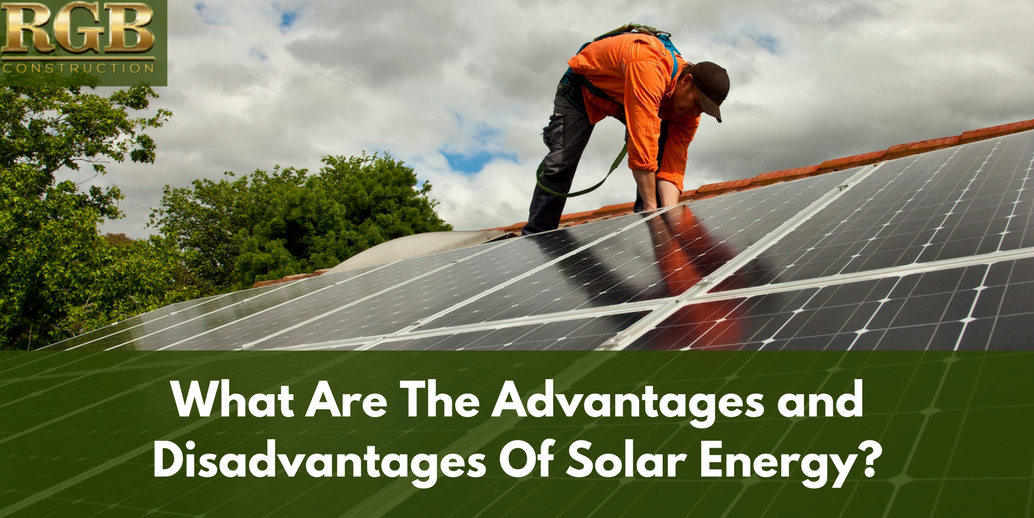Most anyone that is environmentally inclined or aware of the high cost of utility rates has likely had lingering thoughts about turning to solar energy as their saving grace. Who doesn’t want to be off the grid in some respects? It seems that solar energy is one way of protecting the environment, plus saving on energy costs, but is it for everyone, and what are the advantages and disadvantages of it?
What is Solar Energy?
As you probably already know, solar power is simply the transition of the sun’s powerful energy to usable electricity through materials that act as semiconductors and convert sunlight into electricity. So, rather than giving your hard earned dollars to your area electricity provider, utilizing solar energy could be the path to your future of energy use, but figuring out whether you can utilize solar energy where you live, in some capacity, is the first place to start. Also, understanding the advantages and disadvantages of solar energy are other factors that need to be taken into consideration.
Advantages of Solar Energy
Obviously, the main advantage, or benefit, of utilizing solar power is preservation of the earth’s environment. Other advantages and benefits of solar energy include:
- Renewable Energy–The sun is a source that is bountiful, sustainable and renewable and has an indefinite output of thousands of years in comparison to fossil fuel production.
- Cost Effective – Solar power is extremely cost effective. Though the preliminary installation costs are high, the panels themselves are stationary and require limited maintenance and repairs, so their use is basically free.
- Environmentally Friendly – Solar panels do not emit the carbon pollution that a normal household heating or cooling system would, and the installation of a solar panel system can cancel out any excessive pollution that normal households produce over time.
- Wise Investment – Solar panel systems offer homeowners and businesses an excellent return on their investment and bring more lucrative returns than savings or other types of investment accounts.
- Tax Incentives – Many states and municipalities offer those who invest in solar panels tax incentives for installing and utilizing such systems. The tax incentives are different with each state and not every state offers such incentives, so it is best to check ahead of time if you are looking for tax breaks.
- Electric Company Buybacks – If you own and utilize solar panels, it is likely that your system produces excess energy. Your electrical provider may very well want to pay you for that surplus energy, which is all part of your investment return, plus it assists in energy cost reduction and less air pollution.
- Home Value Increase – There is no doubt that utilizing solar panels increases the value of a home and if utility costs are escalating in a particular area, homeowners will see an even larger increase in the value of their homes.
- Silence is Golden – Solar panels make no noise in comparison to noisy air conditioning units or even smaller room size air conditioners that fit in windows or other spaces. The lack of noise is a relaxing aspect whether day or night. Who wants noise when you can have a calm environment and sleep through the night?
Disadvantages of Solar Panels
Though there are numerous advantages to installing and utilizing solar panels, there are also drawbacks, which include:
- Initial Installation Expenses – Homeowners usually face the realization that solar panel installation is an expensive endeavor. Homeowners and businesses can expect to pay substantially for installations that can average close to $10,000 and up to $15,000, and possibly more.
- Daily Sun – If you live in continuously cloudy or rainy area, solar panels may not be as advantageous as you thought, as a home requires significant sunlight to operate solar panels. If the sunlight is more consistent, there are tracking devices available as mounts that can help determine the sun’s movement and path, though these mounting devices can be expensive.
- Cumbersome Equipment – The batteries that accompany solar panel systems can be cumbersome and not easily moved. In order to retain heat in a home during cold spells, the batteries must be charged to produce the needed heat. No one wants to deal with awkward batteries during a cold snap.
- Possible Repairs – Repair work with solar panels is limited, but it is necessary to realize that damage can be costly, and it usually comes in the form of severe weather through wind, hail, falling debris and other occurrences. Intensive damage could result in thousands of dollars worth of repairs.
Solar panels are here to stay and will only increase in their use and value as more and more homeowners and businesses desire credible, cost efficient and environmentally friendly alternatives to energy use. If you want that kind of energy advantage, complete the online contact form and one of our experts will get to you with the information you need to decide whether solar panels are part of your future.







